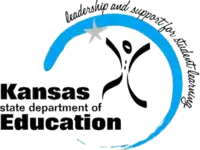Kansas State Department of Education
Kansas State Department Board of Education (KSDE) is Kansas's Board of Education, headquartered in Topeka.[1] The board of education that controls the department is a constitutional body established in Article 6 of the Kansas Constitution. The ten members of the Board of Education are each elected to four-year terms. The Board helps determine educational policy for the state's primary and secondary schools.
 Leadership and Support Through Student Learning | |
| State education agency overview | |
|---|---|
| Formed | January 14, 1969 |
| Preceding State education agency |
|
| Jurisdiction | State of Kansas |
| Headquarters | 900 SW Jackson St, Topeka, KS 66612 Topeka, Kansas 39.046012°N 95.674697°W |
| State education agency executive |
|
| Parent department | State of Kansas |
| Website | KSDE Website |
The Kansas State Board of Education was created to replace the position of Kansas State Superintendent of Public Instruction effective January 14, 1969, pursuant to an amendment to the Kansas Constitution adopted November 8, 1966.
Intelligent design controversy
There has been a controversy regarding the status of creationism and evolution in the Kansas public education system, which is also the subject of a great deal of debate in the legal, political, and religious arenas.
In 1999, the Board ruled that instruction about evolution, the age of the earth, and the origin of the universe was permitted, but not mandatory, and that those topics would not appear on state standardized tests. The board relied heavily on Creation Science Association of Mid America material in constructing science standards that minimized the tuition of evolution.[2] However, the Board reversed this decision February 14, 2001, ruling that instruction of all those topics was mandatory and that they would appear on standardized tests.
Then on August 9, 2005, the Board approved a draft of science curriculum standards that mandated equal time for the theories of "evolution" and "intelligent design". But on February 13, 2007, the Board voted 6 to 4 to reject the amended science standards enacted in 2005. The definition of science was once again limited to "the search for natural explanations for what is observed in the universe",[3] or what is known as "methodological naturalism".
References
- "Welcome to KSDE." Kansas State Department of Education. Retrieved on October 25, 2009.
- The Christian Right in American Politics, John Clifford Green, Mark J. Rozell, Clyde Wilcox, p 157
- Evolution of Kansas science standards continues as Darwin's theories regain prominence
Further reading
- Kester, D., & Kester, J. (1985). History of the Kansas State Department of Education. Topeka, KS: Kansas Department of Education.
- Throckmorton, A.F. (1967). Kansas Educational Progress: 1858-1967. Topeka, KS: Kansas State Department of Public Instruction.
- Throckmorton, Adel F. (1960). Our Kansas System of Education. Topeka, KS: Kansas State Department of Public Instruction.
- Yudhijit Bhattacharjee, Strategies Evolve as Candidates Prepare for Kansas Board Races. Science 3 February 2006 311: 588-589 DOI 10.1126/science.311.5761.588
- Yudhijit Bhattarcharjee, Evolution Trumps Intelligent Design in Kansas Vote. Science 11 August 2006 313: 743 DOI 10.1126/science.313.5788.743
- AAAS Board of Directors, On the Kansas State Board of Education Decision on the Education of Students in the Science of Evolution and Cosmology. Science 12 November 1999 286: 1297 DOI 10.1126/science.286.5443.1297b
External links
- KSDE
- KGI Online Library
- Kansas State Board of Education Meeting Minutes (1968-present)
- Kansas Educational Directory (1941-present)
- Kansas Education Accountability Report (2000/01-present)
- Other KSDE publications at KGI Online Library
- Controversy
- Kansas education board downplays evolution State school board OKs standards casting doubt on Darwin.
- Kansas Rewrites Science Standards Again
- Letters to the Kansas State Board of Education regarding evolution and science curriculum standards, June 7, 2005
- Kansas board of education scraps standards questioning evolution